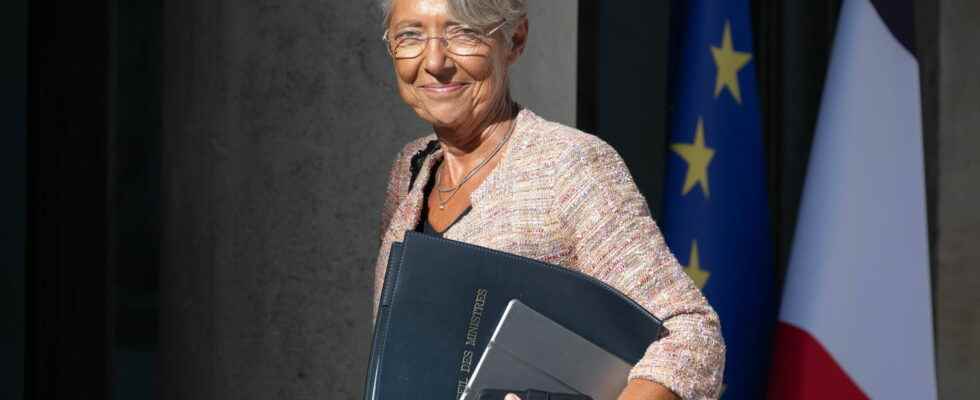Elisabeth Borne. The Prime Minister must call on companies for energy sobriety and to reduce their energy consumption by 10% during her speech before the Medef, this Monday, August 29, 2022.
[Mis à jour le 29 août 2022 à 11h35] Reduce energy consumption by 10%. Here is one of the objectives that Elisabeth Borne will set in front of the Medef this Monday, August 29. Before the bosses’ union, the Prime Minister must unfold the government’s expectations for companies in terms of employment and above all ecological transition, with an emphasis on energy sobriety. The tenant of Matignon will therefore call for “general mobilization” and “savings chosen rather than rationing suffered” according to the indiscretions of the France info. Efforts and savings that will have to be put in place from September because the time is urgent and Elisabeth Borne should meet with entrepreneurs in a month to see the first reductions in consumption. “If we are not up to it, we will have to activate much more restrictive measures”, has already indicated Matignon.
Binding measures are already being studied by the Council of State, in particular two decrees: one on the extinction of illuminated advertisements at night and the other on the closing of the doors of air-conditioned or heated establishments. The government is preparing ways to force companies to save money. “We did not wait for the Prime Minister to return to sobriety”, declared the president of Medef, Geoffroy Roux de Bézieux, on France Inter a few hours from Elisabeth Borne’s speech. The union representative assures on behalf of Medef: “We will try, we will make efforts, everyone is in the same boat, we obviously have an interest in reducing our consumption”. These first efforts could go through the temperature of the premises by simply heating to 19°C and other measures, some of which were listed by Elisabeth Borne during her meeting with the contractors.
Will Elisabeth Borne tax superprofits?
This is another point that will focus attention: who is to tax the superprofits of companies? The delicate subject, defended by part of the majority and rejected by the Minister of the Economy Bruno Le Maire and the Head of State Emmanuel Macron, is of close interest to the employers’ union. Elisabeth Borne indicated in the columns of Parisian August 28 not to close the door to this possibility but for the moment the idea is not yet on the table. “The most effective and concrete thing for the French is when a company, when it can, lowers prices for the consumer and gives purchasing power to its employees. […] In the current period, everyone must be responsible. I will have the opportunity to recall it on Monday, at the Medef”, declared the Prime Minister who promises to follow the government’s policy on taxes: “We have not stopped lowering taxes, I will not radically change my position. by starting to impose taxes on all businesses. On the other hand, no one would understand that companies generate exceptional profits even though the French may be worried about their purchasing power.
Before being appointed Prime Minister, Elisabeth Borne was Minister of Labor in the Castex government, after having held the portfolios of Transport and Ecological Transition since 2017. Relatively little known to the French, which can constitute “an asset” in her new functions, it was however “more so than were Édouard Philippe and especially Jean Castex” when they arrived at Matignon.
A graduate of Polytechnique, a tenacious technician, deemed loyal, Elisabeth Borne is in any case perceived by Macronie as having proven herself in government throughout the last five-year term. This former chief of staff of Ségolène Royal, who was also prefect and leader of large public companies such as the RATP, also has the merit of belonging to the left wing of the majority, an asset in the run-up to the legislative elections and the he hour when new social reforms are announced, starting with “the mother of the battles” on pensions.
Elisabeth Borne appointed Prime Minister
Elisabeth Borne was appointed Prime Minister by Emmanuel Macron on May 16, 2022, after weeks of speculation following the latter’s re-election on April 24. The Head of State had assured a few days before this appointment that he wanted by his side “someone sensitive to social, environmental and productive issues”, a personality “embodiing both ‘renewal’ and at the same time time ‘someone solid, capable of doing 20 hours in front of fifteen million viewers and of holding in the cauldron of the Assembly, during questions to the government'”, also said the entourage of the head of state. All with “an asserted ecological sensitivity because Emmanuel Macron has promised to appoint a ‘prime minister in charge of ecological planning'” (Le Monde).
Elisabeth Borne thus imposed herself as the one who ticked the most boxes in this equation. It even became obvious in the very last days before his appointment, especially after the outcry provoked in the majority by the hypothesis Catherine Vautrin, former minister of Nicolas Sarkozy who had fought against marriage for all during the quinquennium by Francois Hollande.
